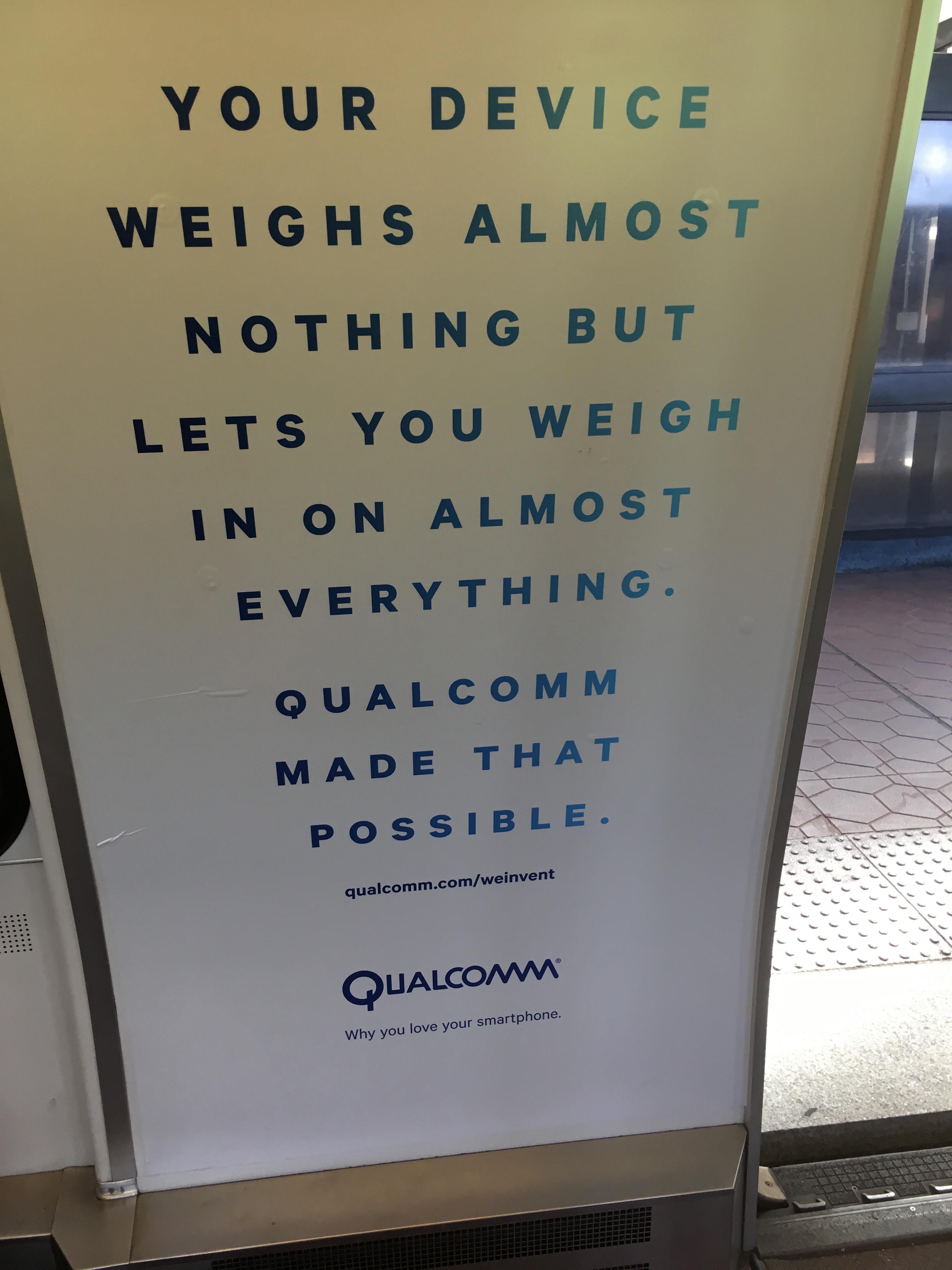Photo of Qualcomm ad taken by Theodore Sotland at the DuPont Circle Metro Station.
By Theodore Sotland
If you have ridden the Metro in Washington D.C. recently, there is a high chance that you have seen advertisements for Qualcomm, Inc. they bear down for a legal battle with Apple that will have far reaching implications in the smartphone industry.
Qualcomm is the largest supplier of chips that allow iPhones and other smart phones the ability to connect to data (think LTE). Qualcomm chips have been in every iPhone up until the iPhone 7, which .[2] This swap is the genesis of the suit; Qualcomm is seeking to ban the entry of iPhones with the Intel chips into the United States.[4] Apple has hit back with numerous allegations, including claims that Qualcomm’s business model is “illegal” and that Qualcomm is participating in monopolistic behavior.[5]
Apple’s illegal business model claim is resting its hat on the holding of recent Supreme Court case Impression Produces, Inc. v. Lexmark Int’l, Inc.[6] This case reaffirmed the principle that the owner of a patent does not retain exclusive rights to restrain “use and enjoyment of the product” once they sell the product. Qualcomm’s business model is to sell Apple the chips and to charge licensing royalties for the technology.[8] Therefore, Qualcomm receives the profits from selling the chips as well as a cut of every iPhone sold due to the licensing, regardless of whether it has Qualcomm technology in it.[9] By claiming that these licensing royalties are entitled to them by patent law, Qualcomm seems to be “double-dipping” with their rights just as Apple has claimed.
Qualcomm will be asking the International Trade Commission (ITC) to ban the importation of new iPhone 7’s into the United States because of patent violations.[11] Qualcomm has not licensed their patent to competitor Intel.[12] Apple contends that the phones should be let through because Qualcomm’s patents are subject to “fair, reasonable, and non-discriminatory (F/RAND)” terms. Industry .”[15] When a company has a patent included as part of a standard, Apple has asserted that they were never offered FRAND licensing terms from Qualcomm for their standard-essential patents (SEP’s) and therefore the phones should not be enjoined from entering the country.[17]
We as consumers could feel the outcome of this case in a few ways. If the ITC rules to enjoin the new iPhone model from entering the country, consumers may not be able to buy it in the United States when it is released worldwide in the fall.[18] Also, Qualcomm could take a huge hit if the ruling in this case mandates that Qualcomm’s royalties should be calculated as only a percentage of the parts of the phone they make. Were the court to adopt this rule, it would greatly benefit phone manufacturers, while subsequently hurting component manufacturers and patent holders such as Qualcomm.
[1] Susan Decker, Alex Webb & Ian King, Apple Sues Qualcomm Over Patent Royalties in Antitrust Case, Bloomberg (January 20, 2017, 3:40 PM), https://www.bloomberg.com/news/articles/2017-01-20/apple-sues-qualcomm-over-patent-royalties-in-antitrust-case.
[2] Ian Kind and Susan Decker, Qualcomm Said to Seek U.S. Import Ban for iPhones, Bloomberg (May 3, 2017, 5:56 PM), https://www.bloomberg.com/news/articles/2017-05-03/qualcomm-said-to-seek-u-s-import-ban-for-iphones.
[3] Id. (explaining that all iPhones up until the iPhone 7 contained only Qualcomm chips. In Qualcomm’s suit against Apple, they are alleging that Apple has “knocked down” the performance of their chips to match that of the Intel chips so there will be no difference in performance between iPhones with different types of chips).
[4] Christian de Looper, Apple v. Qualcomm: Everything You Need to Know, Digital Trends (July 7, 2017, 6:51 AM), https://www.digitaltrends.com/business/apple-vs-qualcomm-news/.
[5] Complaint at 1-3, Apple, Inc. v. Qualcomm, Inc., No. 3:17-CV-00108 (S.D. Cal. Jan. 20, 2017).
[6] Impression Produces, Inc. v. Lexmark Int’l, Inc., 137 S. Ct. 1523 (May 30, 2017); Susan Decker, Apple Alleges ‘Mounting Evidence’ Against Qualcomm, Bloomberg (June 20, 2017, 8:00 AM), https://www.bloomberg.com/news/articles/2017-06-20/apple-alleges-mounting-evidence-against-qualcomm-s-business.
[7] 137 S. Ct. at 1532.
[8] Decker, supra note 6.ote 12 te 12 ore of a profit. vI cite to add this parenthetical too?receive siginifigantly less in royalties ore of a profit. v
[9] Id.
[10] Id.
[11] Ian Kind and Susan Decker, Qualcomm Said to Seek U.S. Import Ban for iPhones, Bloomberg (May 3, 2017, 5:56 PM), https://www.bloomberg.com/news/articles/2017-05-03/qualcomm-said-to-seek-u-s-import-ban-for-iphones.
[12] Susan Decker, Alex Webb & Ian King, Apple Sues Qualcomm Over Patent Royalties in Antitrust Case, Bloomberg (January 20, 2017, 3:40 PM), https://www.bloomberg.com/news/articles/2017-01-20/apple-sues-qualcomm-over-patent-royalties-in-antitrust-case.
[13] Compl. at 43-51, Apple, Inc. v. Qualcomm, Inc., No. 3:17-CV-00108 (S.D. Cal. Jan. 20, 2017).
[14] Id.
[15] Decker, supra note 12.
[16] Id.
[17] Ian Kind and Susan Decker, Qualcomm Said to Seek U.S. Import Ban for iPhones, Bloomberg (May 3, 2017, 5:56 PM), https://www.bloomberg.com/news/articles/2017-05-03/qualcomm-said-to-seek-u-s-import-ban-for-iphones.
[18] Kind, supra note 17.
[19] Decker, supra note 12 (explaining that Qualcomm’s current licensing percentage is based of the price of the entire phone).
[20] See Id. (demonstrating that patent holders would be hurt because they would receive significantly less in royalties on the overall product percentage wise).
[21] Kind, supra note 17.


